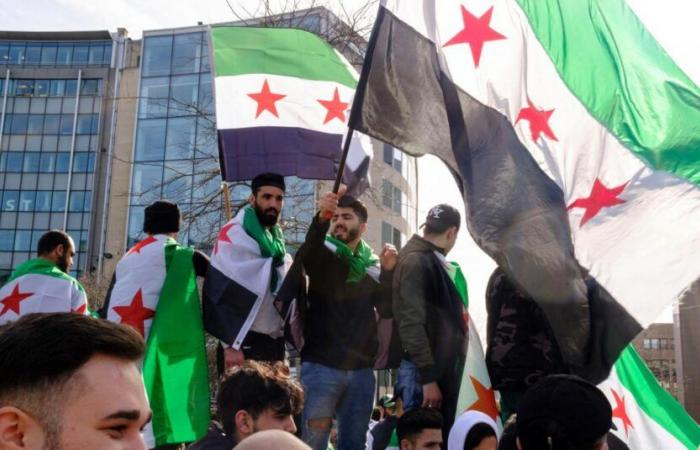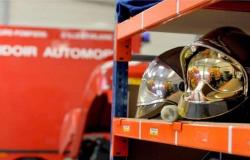The Syrians of Belgium have not lost a bit of the fall of dictator Bashar Al-Assad this weekend. They all say they want to set foot on their native land again, but cannot imagine abandoning Belgium.
“When I called my mother after the fall of the regime, she said she wanted me to take the first plane out of Belgium for Syria. I promised to visit him, but above all I decided to enjoy the moment. Today I wonder what my role is», asks Basel Adoum, a Syrian refugee who arrived in Brussels eight years ago. Since his arrival, he has started a thesis at ULiège on the migratory careers of Syrian refugees in Brussels and now occupies a position of socio-cultural mediator in the municipalities of the ring. Today, like many other Syrians, Basel Adoum sees his future conditionally. “It is too early to think about the question of definitive return to the country. But what is certain is that the Syrians here will want to at least visit Syria as soon as the airports are open.”
Obada Otabashi arrived in Belgium in 2015 and opened We Exista Syrian restaurant aimed at facilitating access to work for people who have fled zones of war and persecution. “Last week, I don’t think a single Syrian emigrant had a minute of sleep. The feelings are impossible to describe, but they were shared between happiness and fear that bad things happen to our loved ones on site in conflicts.” For him, and whatever political observers say, the Syrian situation cannot be worse than in the last 50 years. “In every country, when a dictatorship falls, there is disorder.”
“I love Belgium. The people, their hospitality, how we were welcomed. Our friends here have become our family. So it also became our country
Obada Otabashi
Syrian refugee and founder of the We Exist restaurant
The question of returning home is the most difficult for him, although he wants to return there for some time in order to find those with whom he has never lost contact. “I love Belgium. The people, their hospitality, how we were welcomed. Our friends here have become our family. So it also became our country, and there’s a Syrian proverb that sort of says that you can’t choose between your mother and your wife. I don’t want to build my life outside of Belgium, but I can’t live forever without Syria.”
Building bridges
Marco Martiniello, director of research at the FNRS and director of the Center for Ethnicity and Migration Studies at the University of Liège, is not surprised by these contradictory feelings. “It’s difficult for people who arrive in Belgium or elsewhere with the wish of returning permanently one day. The overall cost is often much higher when it comes to leaving again, you often have to rebuild everything from scratch.” An analysis that crosses all migratory histories, from the last century to the war in Ukraine.
“Once established, return policies do not actually cause an explosion of applications.» However, they facilitate the returns of those who have not yet built a new life in their host land or who, a smaller minority, are convinced that they will return to their country of origin. “What is different today is that it is easier to stay in touch with your country of origin thanks to new information and communication technologies.” For example, this Wednesday, a Facebook group “Syrian cultural and artistic collective” was created and brought together 1,300 members in 24 hours, including Basel Adoum. “People are asking the question of the reconstruction of the Syrian cultural sector from Europe”, a relatively new element for the socio-cultural worker who had noted, during his research, a weak Syrian solidarity network in Belgium. Obada Otabashi also hopes to be able to build bridges, “as we did in Belgium by connecting two communities with We Existthe challenge here is to connect people who are on two different continents.
Double absence
From now on, the ball is in the political court, warns Marco Martiniello. The announcement by the Secretary of State for Asylum and Migration, Nicole De Moor (CD&V), of suspending the asylum applications of the 2,350 Syrians in Belgium is, in the eyes of the researcher, a dangerous signal. “There is the risk of a double absence, the fact of being neither here nor there. Given the recent measures taken here, it is not surprising that Syrians who have refugee status are worried about its removal. We will also have to see what the new regime there will do. But it creates a feeling of exteriority for this community.
The abolition of refugee status for those who have arrived in Belgium over the last five years is also openly considered by the Secretary of State. “I myself went through Fedasil,” says Basel Adoum. I can imagine the feeling of confusion for those still waiting and I’m really hoping for more explanation from Nicole De Moor. On what legal basis are these procedures frozen? From the beginning, we have been told that the question of asylum is treated on personal grounds. However, this recent decision proves the opposite.” Marco Martiniello completes by affirming that those who enjoy Belgian nationality are the best legally protected, but that “for many, we wait too long to decide on the request. This increases objective precarity, the feeling of precariousness and insecurity, which inevitably leads to despair.”
Since 2011, around 35,000 Syrians have benefited from international protection in Belgium, including 4,725 in 2024, for three requests for voluntary return. For this community, recent events have given rise to new or long-lost hope. “Today, my biggest fear is walking past the Syrian embassy in Brussels and seeing that nothing has changed. Mentalities must progress and open up. If the same system remains and only the names change, you can’t really call it a change.” This signal could therefore be decisive.






